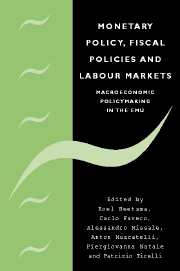Book contents
- Frontmatter
- Contents
- List of figures
- List of tables
- List of contributors
- Acknowledgements
- Editors' introduction
- Part I Monetary policy
- Part II Fiscal policies
- Part III Labour markets
- 11 Monetary institutions, monetary union and unionised labour markets: some recent developments
- 12 Inflationary performance in a monetary union with large wage setters
- 13 On the enlargement of currency unions: incentives to join and incentives to reform
- Index
12 - Inflationary performance in a monetary union with large wage setters
from Part III - Labour markets
Published online by Cambridge University Press: 22 September 2009
- Frontmatter
- Contents
- List of figures
- List of tables
- List of contributors
- Acknowledgements
- Editors' introduction
- Part I Monetary policy
- Part II Fiscal policies
- Part III Labour markets
- 11 Monetary institutions, monetary union and unionised labour markets: some recent developments
- 12 Inflationary performance in a monetary union with large wage setters
- 13 On the enlargement of currency unions: incentives to join and incentives to reform
- Index
Summary
Introduction
In the literature on international monetary policy games, the switch from uncoordinated national monetary policies to a monetary union is generally argued to lead to higher inflation. One reason why the formation of a monetary union is likely to raise inflation for a given level of employment is that the unified central bank's incentive to boost employment is no longer restrained by the cost of the exchange rate depreciation that follows unilateral monetary expansions (Rogoff 1985a). Higher inflation may then result as a consequence of rational agents anticipating the central bank's attempt to create surprise inflation.
A further channel leading to higher inflation has been recently stressed in the literature on strategic wage setting. Basically, it is argued that wage setters may be induced to behave more aggressively in a monetary union as they perceive an increase in their wages to have a smaller impact on the union-wide inflation rate relative to the one on their country-specific inflation rate.
As the move to a monetary union alters the strategic environment faced by the central bank and labour unions, the incentives of both actors should be explicitly accounted for when analysing the macroeconomic impact of such a monetary policy regime shift. In this chapter, we accomplish this task in a simple general-equilibrium setup in the tradition of the new open economy macroeconomics. Drawing on Cavallari (2001b), we model a two-region world economy characterised by unionised labour markets and imperfect competition in both the factor and goods markets.
- Type
- Chapter
- Information
- Monetary Policy, Fiscal Policies and Labour MarketsMacroeconomic Policymaking in the EMU, pp. 327 - 343Publisher: Cambridge University PressPrint publication year: 2004
- 4
- Cited by



